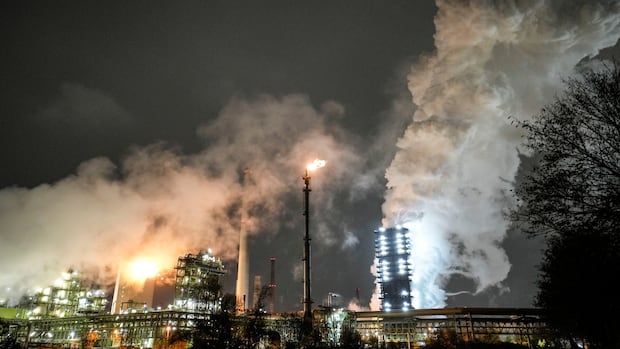Might tariffs battle local weather change?

Tariffs are a sizzling matter as of late. U.S. president-elect Donald Trump says he is a “huge believer in tariffs,” and has threatened a 25 per cent tariff on merchandise from Canada and Mexico except they curb the stream of medicine and migrants throughout the border.
Trump says tariffs are a “a robust device not solely economically, but additionally for getting different issues exterior of economics.”
Might that embody getting nations to chill the planet?
Canada and the U.S. are amongst these discussing carbon tariffs or carbon border changes as a approach to shield native business and obtain local weather objectives on the identical time.
However do they work? The place are they being carried out? And what’s going to that do to commerce and the price of dwelling?
Here is a better look.
What’s a carbon tariff?
A tariff is a tax or responsibility on items and companies imported from one other nation, typically primarily based on the worth of the imports. The objective is usually to boost the worth of imports relative to domestically produced items and companies to provide these made at dwelling a aggressive benefit. Tariffs additionally generate income.
A carbon tariff or carbon border adjustment (CBA) will also be utilized to imports, primarily based on the carbon emissions produced by the imported items or companies.
U.S. president-elect Donald Trump stated on Monday he would signal an government order imposing a 25 per cent tariff on all merchandise coming into the USA from Mexico and Canada.
Why would nations need to implement them?
There are each financial and environmental causes.
Locations corresponding to Canada and Europe have put a value on carbon to encourage firms to put money into decarbonization. That raises manufacturing prices for industries corresponding to metal that generate numerous emissions.
Many such industries face stiff competitors from nations that may make merchandise extra cheaply as a result of they do not have carbon pricing.
Carbon border changes are charges particularly designed to degree the taking part in discipline and make home merchandise extra aggressive.
Aaron Crosbey, a senior affiliate on the Winnipeg-based Worldwide Institute for Sustainable Improvement, stated technically, CBAs aren’t tariffs, that are closely restricted below worldwide commerce agreements (although “CBA” is typically used interchangeably with “carbon tariff,” a extra basic time period).
Moderately, CBAs are border prices that correspond to home taxes, that are typically allowable below worldwide commerce guidelines (related border prices are in place to regulate for Canada’s items and companies tax, he notes).
Laurie Durel, a Canadian postdoctoral researcher on the Oeschger Centre for Local weather Change Analysis of the College of Bern, has studied CBAs within the context of worldwide commerce legislation. She says with out some sort of pricing adjustment on imports, the manufacturing and sale of products corresponding to metal could merely shift to nations with dirtier manufacturing on the expense of nations with stronger laws.
“Then mainly [there] will nonetheless be the identical quantity of greenhouse gasoline emissions within the ambiance, however simply with out the roles in [places like] the EU.”
This shift, referred to as carbon leakage, may trigger international emissions to rise.
McMaster College engineering Prof. Giancarlo Dalle Ave explains how “inexperienced” metal is made by direct diminished iron and electrical arc furnaces, and why it is such an enormous change from conventional strategies.
How do they work?
The European Union’s Carbon Border Adjustment Mechanism (CBAM) is typically described as “the primary carbon border tariff on the planet.” It is the one instance we have now to date, however totally different nations have proposed alternative ways to implement these sorts of import charges.
The EU will start gathering carbon charges by CBAM in 2026, however started a transitional part in 2023, which entails gathering information about emissions generated by the manufacturing of various items.
Initially, the charges shall be utilized to supplies that historically generate numerous emissions to provide and have numerous international competitors, together with iron, metal, cement, fertilizers, aluminum, hydrogen and electrical energy.
Since European producers should pay charges for the carbon emissions they generate, the CBAM will take that into consideration and alter the worth of imports accordingly.
Imports from nations with comparable carbon pricing wouldn’t have to pay additional.
Different nations plan to implement their very own CBAs, together with Taiwan in 2025 and the U.Ok. in 2027.
Though the U.S. has no nationwide value on carbon emissions, there are 4 carbon tariff payments — one Democratic, one Republican and two bipartisan — earlier than the U.S. Congress proper now.
Canada held a public session on CBAs in 2022, however has not launched any outcomes.
Crosbey stated many different nations are wanting into them, together with Australia, Japan, Brazil and Turkey.
“So it is sort of mushrooming,” he stated.
Do they really work?
Dave Sawyer, principal economist on the Canadian Local weather Institute, has completed modelling that exhibits CBAs do assist home business keep aggressive whereas driving decarbonization.
“After which what additionally they do, which is actually cool, is that they drive different nations to begin doing their very own carbon pricing insurance policies.”
Crosbey stated Europe’s CBAM has already completed that, pushing each Turkey and Brazil to place a value on carbon domestically.
That is as a result of having home carbon taxes equal to CBAM permits nations to keep away from paying Europe’s import charges — and if carbon taxes are being paid both method, it is higher to gather them at dwelling to reinvest in decarbonization than hand them over to international governments as import taxes.
What occurs while you exempt some folks from a controversial federal tax, however not others? About That producer Lauren Hen explains why some premiers are criticizing the federal authorities’s carbon tax exemption and the way the controversial tax is creating unlikely allies.
CBAs additionally enable jurisdictions like Europe to implement stricter emissions laws. Till now, many nations handled carbon leakage by permitting dirtier industries to emit a certain quantity of carbon totally free, and charging them just for carbon emitted above that degree. Crosbey stated CBAM permits Europe to eliminate these allowances.
“While you try this, you get outcomes,” he stated. “You get decarbonizing investments in a rush.”
Nonetheless, some modelling research, corresponding to one revealed earlier this yr by Xinlu Solar and colleagues at College School London, counsel CBAM might not be very environment friendly at stopping carbon leakage and subsequently lowering international emissions.
Durel stated if Europe is the one jurisdiction implementing such insurance policies, nations could merely ship their cleanest supplies to Europe, and proceed utilizing soiled manufacturing to export to different nations.
What are the downsides?
“The downsides are: that is insanely sophisticated, solely partially efficient” and a few implementations could also be unlawful, stated Crosbey.
International locations have to calculate the emissions generated within the manufacturing of various merchandise, how a lot their carbon pricing provides to the price of manufacturing, and the way that compares to carbon pricing regimes in different nations.
Durel stated when CBAs have been first proposed almost twenty years in the past, there was widespread settlement that they might violate worldwide commerce legal guidelines.
However that is modified. “There’s a rising consensus that that is authorized but additionally respectable,” stated Durel.
She credit a greater understanding of the urgency of local weather change, and what must be completed to align local weather targets with the Paris Settlement.
Nonetheless, as a result of Europe’s CBAM hasn’t been absolutely carried out or contested but, Durel and Crosbey each say it isn’t clear but whether or not it is compliant with World Commerce Group guidelines.
Brazil, South Africa, India and China have protested carbon-based commerce measures corresponding to CBAM, saying they’re unilateral, enhance prices and will decelerate international decarbonization. They’re lobbying for them to be on the agenda at subsequent yr’s United Nations local weather summit in Brazil.
Durel stated insurance policies like CBAM can drawback growing nations that may’t but decarbonize their industries.
Lastly, like every import tax and extra administrative procedures, CBAs add prices that may probably be handed onto the buyer, elevating costs.
Curiously, current polling within the U.S. confirmed widespread public help for carbon tariffs — and linking commerce to local weather efficiency — even when it meant some enhance in folks’s vitality prices, stated Barry Rabe, a professor of environmental coverage on the College of Michigan and a senior fellow on the Brookings Establishment, who performed the analysis.
He added, “This appears to have a sort of cachet throughout the partisan spectrum.”
The parliamentary finances officer launched an up to date evaluation on the carbon tax Thursday, after it made an ‘inadvertent error’ in a earlier evaluation. Conservative Chief Pierre Poilievre says his ‘focus is on axing the carbon tax’ when requested by a reporter about his plans for industrial carbon pricing.
How is Canada affected by curiosity in CBAs?
Sawyer says his modelling exhibits that as a result of Canada has carbon pricing (each client and industrial), it probably would not pay a lot below Europe’s CBAM initially.
However that would change if Canada determined to axe its carbon tax, because the federal Conservative Celebration has proposed (though it hasn’t been clear whether or not each industrial and client carbon pricing could be minimize). Canadian firms may wind up paying carbon taxes on their exported items anyway — and the nation may fall behind technologically, Durel cautioned.
“Canadian merchandise may get deprived if there isn’t any extra regulation to decarbonize or to encourage firms to decarbonize,” she stated. “Perhaps we’re higher off with retaining our carbon tax on our merchandise, as a result of then we maintain the income and we are able to reinvest it within the decarbonization in Canada.”










